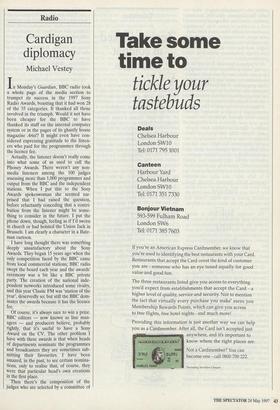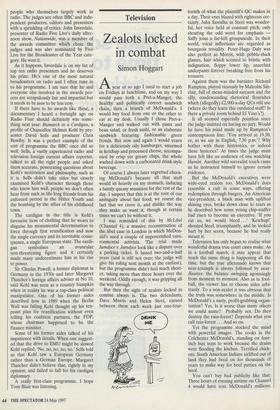Radio
Cardigan diplomacy
Michael Vestey
In Monday's Guardian, BBC radio took a whole page of the media section to trumpet its success in the 1997 Sony Radio Awards, boasting that it had won 28 of the 35 categories. It thanked all those involved in the triumph. Would it not have been cheaper for the BBC to have thanked its staff on the internal computer system or in the pages of its ghastly house magazine Ariel? It might even have con- sidered expressing gratitude to the listen- ers who paid for the programmes through the licence fee.
Actually, the listener doesn't really come into what some of us used to call the Phoney Awards. There weren't any non- media listeners among the 100 judges assessing more than 1,000 programmes and output from the BBC and the independent stations. When I put this to the Sony Awards spokeswoman she seemed sur- prised that I had raised the question, before reluctantly conceding that a contri- bution from the listener might be some- thing to consider in the future. I put the phone down, though, feeling as if I'd sworn in church or had hoisted the Union Jack in Brussels. I am clearly a character in a Bate- man cartoon.
I have long thought there was something deeply unsatisfactory about the Sony Awards. They began 15 years ago when the only competition faced by the BBC came from local commercial stations; BBC radio swept the board each year and the awards' ceremony was a bit like a BBC private party. The creation of the national inde- pendent networks introduced some rivalry, and this year Classic FM was 'station of the year', deservedly so; but still the BBC dom- inates the awards because it has the licence fee.
Of course, it's always nice to win a prize. BBC editors — now known as line man- agers — and producers believe, probably rightly, that it's useful to have a Sony Award on the CV. The other problem I have with these awards is that when heads of departments nominate the programmes and broadcasters they are sometimes sub- mitting their favourites. I have been amazed, in the past, to see certain nomina- tions, only to realise that, of course, they were that particular head's own creations in the first place. Then there's the composition of the judges who are selected by a committee of people who themselves largely work in radio. The judges are often BBC and inde- pendent producers, editors and presenters with a sprinkling of critics. John Inverdale, presenter of Radio Five Live's daily after- noon show, Nationwide, was a member of the awards committee which chose the judges and was also nominated by Five Live for the Broadcaster of the Year cate- gory. He won it.
As it happens, Inverdale is on my list of top ten radio presenters and he deserves his prize. He's one of the most natural broadcasters on radio and I often tune in to his programme. I am sure that he and everyone else involved in the awards pro- cess are scrupulously fair and impartial but it needs to be seen to be less cosy.
If there have to be awards like these, a documentary I heard a fortnight ago on Radio Four should definitely win some- thing next year: Bismarck in a Cardigan, a profile of Chancellor Helmut Kohl by pre- senter David Sells and producer Chris Bowlby. It was a perfect example of the sort of programme the BBC once did so well. Sells, a vastly experienced radio and television foreign current affairs reporter, talked to all the right people and asked them accurate, penetrating questions about Kohl's motivation and philosophy, such as it is. Sells didn't take sides but closely examined Kohl's character through those who know him well, people we don't often hear from such as life-long friends from his enforced period in the Hitler Youth and the bombing by the allies of his childhood town.
The cardigan in the title is Kohl's favourite item of clothing that he wears to disguise his monumental determination to force through first reunification and now the single currency and its inevitable conse- quence, a single European state. The cardi- gan symbolises an avuncular non-threatening figure and it certainly made many underestimate him in his rise to power. Sir Charles Powell, a former diplomat in Germany in the 1970s and later Margaret Thatcher's foreign affairs adviser at No 10, said Kohl was seen as a country bumpkin when in reality he was a top-class political manipulator. One of his former aides described how in 1989 when the Berlin Wall was falling Kohl thought up his ten- point plan for reunification without even telling his coalition partners, the FDP, whose chairman happened to be the finance minister.
Some of his former aides talked of his impatience with details. When one suggest- ed that the drive to EMU might be slowed Kohl replied, 'No, no, no, no, no.' Sells told us that Kohl saw a European Germany rather than a German Europe. Margaret Thatcher didn't believe that, rightly in my opinion, and failed to fall for his cardigan diplomacy.
A really first-class programme. I hope Tony Blair was listening.



























































 Previous page
Previous page